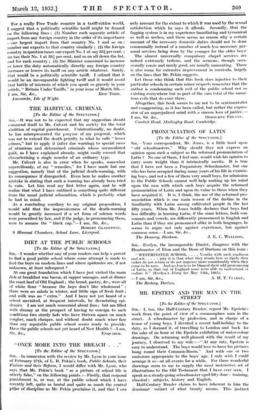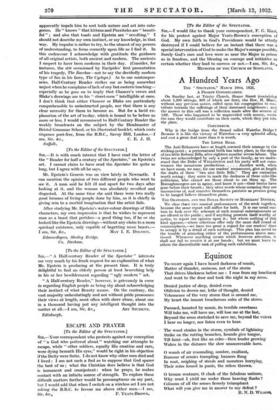MR: EPSTEIN. ' AND THE MAN IN THE STREET
[To the Editor of the SPECTATOR.] Sur,—I, too, like Half-Century Reader, regard Mr. Epstein's work from the point of view of a commonplace man in the street. A schoolmaster by .profession, and in charge of a house of young boys, I devoted a recent half-holiday to the duty, as I deemed it, of travelling to London and back for the sake of an hour at the Epstein exhibition of waterwolour drawings. On returning well pleased with the result of my journey, I observed to my wife :—" At any rate, Epstein is easy to understand. The boys would love to have his pictures hung round their Common-Room." And with one or two omissions appropriate to the boys' age, I only wish I could arrange it so—at all events for a while. For these wonderful drawings seem to me to supply the most instructive set of illustrations to the Old Testament that I have ever seen. 1 speak as a steady-going schoolmaster aged fifty-four : training, classical ; subjects, history and English.
Half-Century Reader claims to have inherent in him the dominant 'nstinet of what beauty means. This instinct apparently impels him to sort both nature and art into cate- gories. He " knows " that kittens and Praxiteles are " beauti- ful " ; and also that toads and Epstein are " revolting." I should not describe my own instinct, or my knowledge, in that way. My impulse is rather to try, to the utmost of my powers of understanding, to focus correctly upon life as I find it. In this endeavour I acknowledge with gratitude the guidance of all original artists, both ancient and modern. The ancients I suspect to have been moderns in their day. (Consider, for instance, the stir occasioned by Euripides' first presentation of his tragedy, The Bacchae—not to say the decidedly modern type of fun in his farce, The Cyclops.) As to our contempor- aries, Half-Century Reader strikes me as being somewhat unjust when he complains of lack of any but esoteric teaching— especially as he goes on to imply that Chaucer's verses and Blake's drawings are to his " street-men " intelligible at once. I don't think that either Chaucer or Blake are particularly comprehensible to uninstructed people, nor that there is any clear necessity for them to become so. But for a lucid ex- planation of the art of to-day, which is bound to be before us more or less, I would recommend to Half-Century Reader the weekly broadcasts on the subject by the Headmaster of Bristol Grammar School, or his illustrated booklet, which costs sixpence post-free, from the B.B.C., Savoy Hill, London.—I



















































 Previous page
Previous page